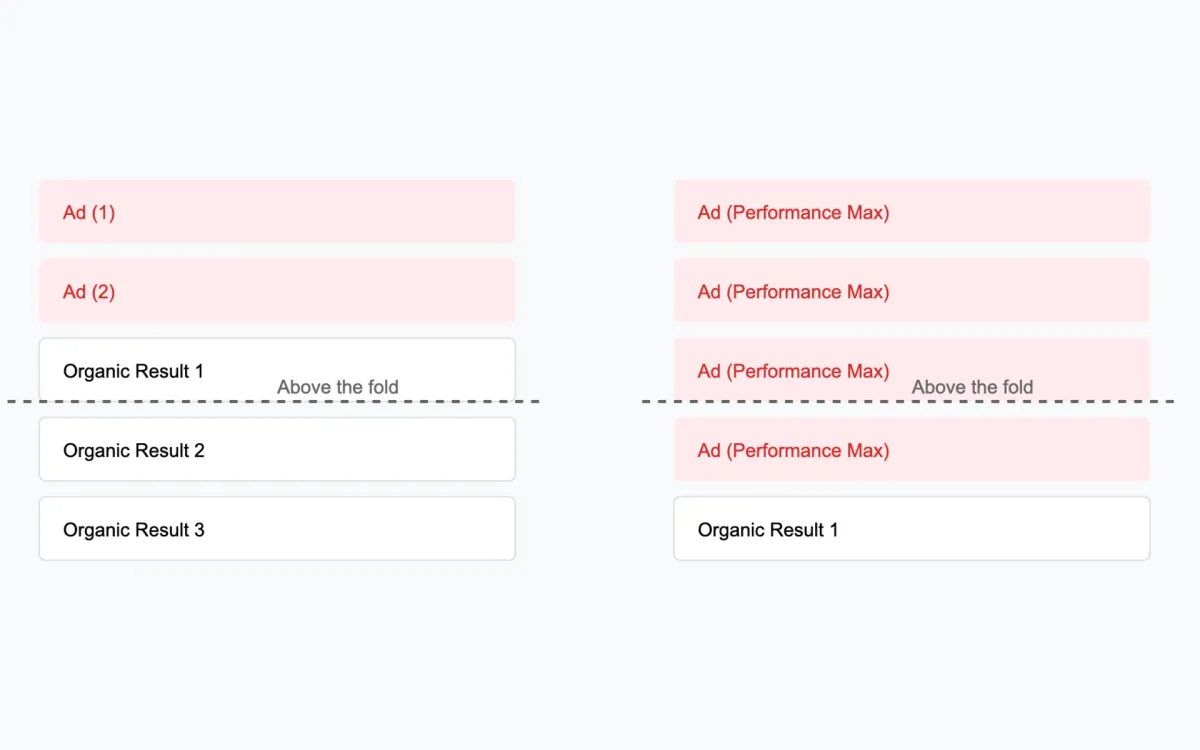

When Google introduced Performance Max campaigns in late 2021, it marked a significant shift in digital advertising. According to Ed Goss, a search marketing expert writing in January 2021, Performance Max represents a new campaign format that incorporates all of Google's ad inventory, including Google Shopping, Search, Display Network, Discover, YouTube, Gmail, and Maps.
However, recent observations from digital marketing professionals and users indicate this automation-first approach may be deteriorating the quality of search results. A notable example emerged on November 9, 2024, when multiple users reported search results being dominated by irrelevant advertisements above the fold – the visible portion of a webpage before scrolling.
When every single result above the fold is an ad for something you didn't search for... How can they pretend this is a good experience? pic.twitter.com/ptXiEWNGyV
— Niche Site Lady (@NicheSiteLady) November 9, 2024
The current state of search results
The problem stems from several key factors:
- Automated targeting across all Google properties
- Limited advertiser control over keyword targeting
- Minimal transparency in placement reporting
- Inability to effectively block irrelevant queries
Understanding the technical framework
How Performance Max Works
Performance Max operates as a "black box" system where advertisers provide:
- Responsive creative assets
- Multiple audience segments for targeting signals
- Optional product feeds
- Budget and bidding parameters
According to Ten Thousand Foot View's analysis, Google then autonomously decides:
- Where to show ads
- When to display them
- Which users to target
- How to allocate budget across platforms
The technical limitations
The system presents several critical limitations:
- No search query reports for advertisers
- Limited placement control
- Inclusion of branded search terms (possible to exclude)
- Restricted negative keyword implementation
The historical context
Traditional Search Advertising
Previously, Google's search advertising model provided advertisers with:
- Specific keyword targeting
- Detailed search term reports
- Granular placement control
- Clear performance metrics
The transition to automation
The shift toward automated systems has progressively reduced advertiser control while increasing Google's ability to serve ads across its network. This transformation accelerated with the mandatory conversion of Smart Shopping campaigns to Performance Max, as documented in early 2022.
Why this matters
Impact on user experience
The current implementation of Performance Max has led to several concerning trends:
- Increased irrelevant ad placements
- Higher percentage of above-the-fold advertising
- Reduced visibility of organic search results
- Diminished search result quality
According to digital marketing experts and user feedback, these issues are particularly problematic for:
- Educational queries
- Informational searches
- Brand-specific lookups
- Technical investigations
Business implications
For businesses and advertisers, the situation presents multiple challenges:
- Difficulty in controlling brand messaging
- Increased competition for branded terms
- Higher costs for relevant placements
- Reduced targeting precision
How Ad Saturation Creates Market Opportunities for ChatGPT Search
The recent launch of ChatGPT Search on October 31, 2024, arrives at a critical moment when Google's Performance Max campaigns are flooding search results with irrelevant advertisements. This timing could prove advantageous for OpenAI's entry into the search market.
The competitive landscape
ChatGPT's search implementation offers several distinct advantages:
- Partnership with trusted news organizations including Reuters and AP
- Real-time access to current information
- Direct source attribution links
- Focus on information accuracy rather than ad revenue
How Google's ad strategy creates vulnerabilities
The current implementation of Performance Max presents several opportunities for competitors:
User Trust Erosion
- Irrelevant ads diminish search result quality
- Users must scroll past multiple unrelated advertisements
- Reduced visibility of organic content damages user experience
Information Access Barriers
- Important organic results pushed below the fold
- Users forced to wade through promotional content
- Difficulty in finding direct answers to queries
Publisher relations
While Google floods results with ads, ChatGPT has taken a different approach by:
- Establishing partnerships with 13 major news organizations
- Creating a sustainable model for journalism
- Providing clear attribution and traffic to content creators
ChatGPT's strategic advantage
OpenAI's search implementation addresses several pain points in Google's current approach:
Quality-First Approach
- Integration with verified news sources
- Real-time information without ad interruption
- Focus on accuracy and relevance
Publisher Collaboration
According to Louis Dreyfus, CEO and Publisher of Le Monde, "AI search will be, in a near future and for the next generations, a primary way to access information." This publisher-friendly approach contrasts sharply with Google's ad-heavy strategy.
Technical Innovation
ChatGPT Search operates on:
- Specialized version of GPT-4o
- New synthetic data generation techniques
- Natural language processing maintaining conversation context
Market share implications
The timing of ChatGPT's search launch could capitalize on growing user frustration with Google's ad-saturated results:
Short-term Impact
- Users seeking alternatives to ad-heavy search results
- Early adopters drawn to cleaner interface
- Professional users valuing accurate, uninterrupted information
Long-term Potential
- Building trust through quality results
- Establishing new standards for search experience
- Creating sustainable partnerships with content providers
Competitive Response
Google faces a strategic dilemma:
- Reducing ad saturation could impact revenue
- Maintaining current practices risks market share
- Balancing user experience against profit expectations
Key Facts
- Performance Max campaigns were introduced in late 2021
- The system automatically manages ad placement across all Google properties
- Advertisers have limited control over where and when ads appear
- Search results increasingly show irrelevant ads above organic content
- Brand term targeting can increase advertising costs
- Limited reporting makes optimization difficult
- Click fraud detection and prevention are challenging within the system
- Advertisers cannot effectively block irrelevant queries or placements

